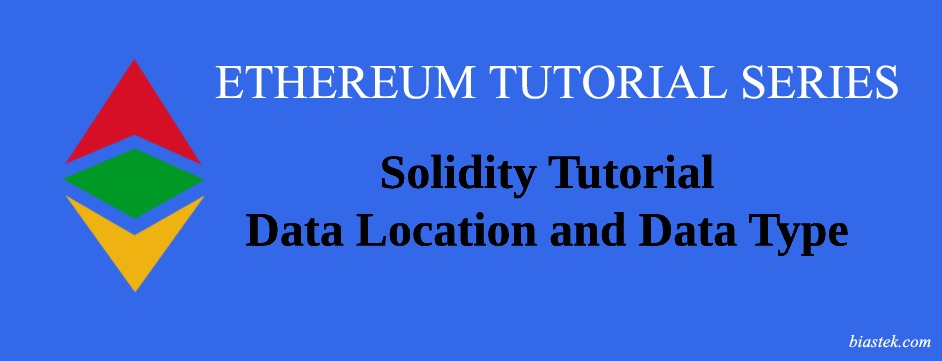- Data Location
The Ethereum Virtual Machine has 4 areas where it can store items.
1.1 Memory which is used to hold temporary values. It is erased between (external) function calls and is cheaper to use.
ex: h(uint[] memory hArray) internal {}
1.2 Storage which is used to hold permanent values. All the contract state variables will be stored in storage. Every contract has its own storage and it is persistent between function calls and quite expensive to use.
ex: function g(uint[] storage gArray) internal {}
1.3 Calldata: All function calls use calldata, which includes function parameters. Calldata is read-only memory area
1.4 Stack which is used to hold small local variables. It is almost free to use, but can only hold a limited amount of values.
There are defaults for the storage location depending on which type of variable it concerns:
- State variables are always in storage
Ex: uint[] storageArray;
- Function arguments are always in memory
- Local variables of struct, array or mapping type reference storage by default
- Local variables of value type (i.e. neither array, nor struct nor mapping) are stored in the stack
2. Data Type
2.1 Bool: It can hold either true or false
EX: bool isComplete = false;
2.2 Signed Integer: they are used to hold signed integers of 8 bits, 16 bits … 256 bits. EX: int8, int16 … int256
Ex: int32 mediumNegativeNumber = -450;
2.3 Unsigned Integer: They are used to hold unsigned integers of 8 bits, 16 bits, 24 bits … 256 bits . Ex: uint8, uint16, uint24 … uint256
Ex: uint16 smallPositiveNumber = 678;
2.4 Strings: In Solidity, there are two ways to create strings: using bytes and string. Bytes is used to create a raw string, whereas string is used to create a UTF-8 string.
string webname = “biastek.com”;
2.5 Var: var is decided dynamically depending on the first value assigned to it. Once a value is assigned, the type is fixed, so if you assign another type to it, it will cause type conversion.
2.6 Address
The length of Ethereum address is 20 bytes (160 bit)
address ownerAddress = 0x10abb5EfEcdC09581f8b7cb95791FE2936790b4E;
Functions provided by the address type:
+ send(): To send Ether in Wei—If the transaction fails on the receiving side, a value of false is returned to the sender but the payment isn’t reverted
if (!destinationAddress.send(10))
revert();
Another way
require(destinationAddress.send(10));
+ call(): To invoke a function on the target contract associated with the address (the target account is assumed to be a contract)
destinationContractAddress.call(“contractName”,
“functionName”);
+ transfer(): To transfer Ether in Wei—If the transaction fails on the receiving side, an exception is thrown to the sender and the payment is automatically reverted
2.7 bytes
Fixed byte: ByteN indicates fixed-size byte array and the range of N is from 1 to 32
bytes1 aa = 0x75;
bytes1 bb = 10;
bytes1 ee = -100;
2.8 Structs: A struct is a user-defined type that contains a set of elements that in general are each of a different type
struct UserInfo {
address account;
string name;
string surname;
UserType uType;
}
2.9 Arrays
+ Static Array
int32[5] memory fixedSlots;
fixedSlots[0] = 5;
//
or
int32[5] memory fixedSlots = [int32(5), 9, 1, 3, 4];
+ Dynamic Array
int32[] unlimitedSlots;
+ To append items to a dynamic array by calling the push member function :
unlimitedSlots.push(10);
unlimitedSlots.push(13);
+ To resize a dynamic array with data location is storage
int32[] unlimitedSlots; 1
//…
unlimitedSlots.length = 5;
+ To resize a dynamic array with data location is memory
int32[] memory unlimitedSlots;
//…
unlimitedSlots = new int32[](5);
2.10 Mappings: implementation of a hash table, which stores values against keys, must declare the type of the key and the type of the value at its declaration
mapping (_KeyType => _ValueType) mapName
Example
uint nextCampaignId;
mapping(uint256 => CampaignData) campaigns; //ValueType is a structure
function start(address recipient, uint256 goal, uint256 deadline) returns (uint id) {
var campaign = campaigns[nextCampaignId];
campaign.recipient = recipient;
campaign.goal = goal;
campaign.deadline = deadline;
nextCampaignId ++;
id = nextCampaignId;
}2.11 Enums: is a custom data type including a set of named values
enum InvestmentLevel {High, Medium, Low}


Hạnh phúc là lựa chọn và trải nghiệm
Blockchain Ethereum – Ví dụ về hàm Delegatecall trong solidity
Blockchain Ethereum (P4) – Kết Nối Các Node Sử Dụng Bootnode
Blockchain Ethereum (P3) – Cài Đặt Private Blockchain trên nền tảng Ethereum
Install web3 and nodejs
Sử dụng Virtual Box